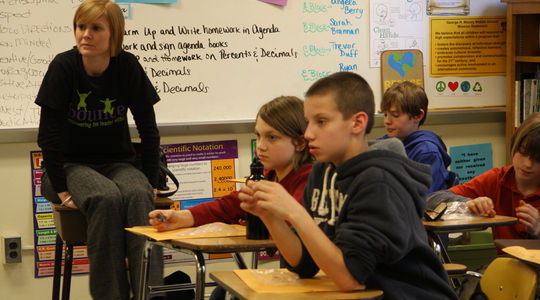Creating a Strengths Based World
Posted by Ann Deaton Share Your Voice

We all like to be recognized and appreciated. We all want to matter to someone. We all want to have an impact in this world of ours. In his book, The Three Signs of a Miserable Job, Patrick Lencioni says that meeting these wants is key to satisfaction in the workplace. When others care to know us at a deeper than surface level, when our work is relevant, and when what we do can be measured, we are far happier in our jobs and, of course, much more likely to stay in them.
So how does this translate into your workplace, your child’s school? Often the things we know about what people need don’t translate into our society’s systems. Take schools for example. In our schools we tend to emphasize verbal learning (reading and writing) and mathematical/logical skills (arithmetic). This fits well for young people who have these learning strengths (what Howard Gardner calls “intelligences”), but what happens to the student who happens to learn through moving around (a kinesthetic learner) or whose strongest intelligence is her interpersonal ability? Typically, these children are scolded for being fidgety or overly talkative, and by the end of elementary school, they are thoroughly dissatisfied with school and unlikely to stay in school through graduation, or to engage in learning even while they sit at their desks.
This happens at work as well. We hire talented people, and we do not always enable them to use their best talents. As the Gallop research in Now, Discover Your Strengths shows, only about 20% of our work force say they have the opportunity to use their strengths every day in the work they do. The other 80% are not fully known and valued for who they are or what they bring. They are therefore, less likely to stay and less likely to do their best work if they do stay.
What is the answer to these challenges? The common answer is a defenseive one---“We can’t just let people do whatever they want!” But perhaps we could do just that! At Ideo, for example, the company allows teams to create innovative products and to take chances to see what emerges in the process. At Montessori Schools, children choose the learning stations they are attracted to, and they stay engaged in their learning as well as doing well on standardized testing. So it is possible.
What can you do today to leverage your strengths?
How can you ensure that your coworkers, colleagues, children, and partners get to leverage theirs?
⇐ Previous Post: Creating a Strengths B... Next Post: The Gap Between Knowin... ⇒
 Ann Deaton
I am a leadership coach, and Managing Partner in Bounce. I love to coach and facilitate with individuals and systems experiencing significant change and growth. The clients I work with, regardless of their age or position, are talented and creative individuals willing to look with fresh eyes at their challenges and opportunities, and to take action based on their discoveries. As a result, they find that they are capable of accomplishing far greater things than they ever imagined. What do you want to accomplish today? Who do you want to be?
Ann Deaton
I am a leadership coach, and Managing Partner in Bounce. I love to coach and facilitate with individuals and systems experiencing significant change and growth. The clients I work with, regardless of their age or position, are talented and creative individuals willing to look with fresh eyes at their challenges and opportunities, and to take action based on their discoveries. As a result, they find that they are capable of accomplishing far greater things than they ever imagined. What do you want to accomplish today? Who do you want to be?
Comments
Share your voice, post a comment.
Login or Register to share.